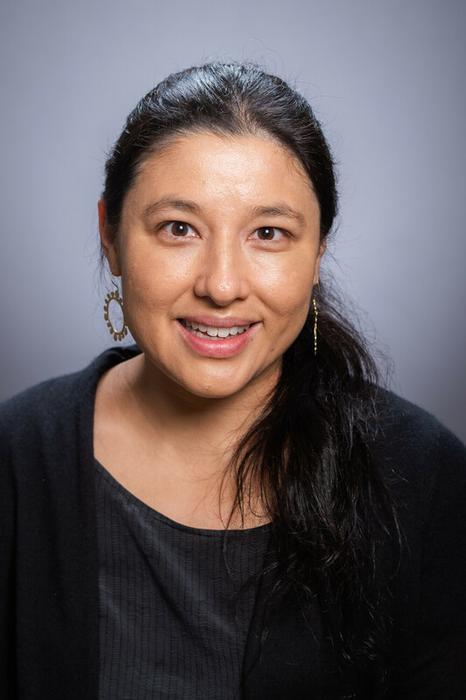The burden of non-communicable diseases like hypertension and diabetes is increasing globally, especially in low-income and middle-income countries where they occur alongside epidemics of communicable diseases like HIV. A large public health survey in South Africa led by Emily Wong, M.D., has assessed the multimorbidity health needs of individuals and communities in rural KwaZulu-Natal and established a framework to quantify met and unmet health needs for individuals living with infectious and non-communicable diseases. The study is published in The Lancet Global Health.

Credit: UAB
The burden of non-communicable diseases like hypertension and diabetes is increasing globally, especially in low-income and middle-income countries where they occur alongside epidemics of communicable diseases like HIV. A large public health survey in South Africa led by Emily Wong, M.D., has assessed the multimorbidity health needs of individuals and communities in rural KwaZulu-Natal and established a framework to quantify met and unmet health needs for individuals living with infectious and non-communicable diseases. The study is published in The Lancet Global Health.
“Applying this framework shows that approximately half of the people living with HIV, diabetes or hypertension in a South African community have unmet health needs and that the unmet needs are particularly high in people living with non-communicable diseases,” Wong said. Wong is a resident faculty member at the Africa Health Research Institute, or AHRI, in Durban, KwaZulu-Natal, South Africa, and an assistant professor in the Division of Infectious Diseases, University of Alabama at Birmingham Department of Medicine and an associate scientist in the UAB Center for AIDS Research.
“The framework introduced by this analysis will help countries to assess their health programs, identify priority areas for intervention, and consider integrated approaches to communicable and non-communicable disease management,” Wong said. “Within South Africa, the findings of this analysis suggest that the need for improved diagnosis care and disease control for people with diabetes and hypertension can be addressed by adapting the health systems that successfully meet the health needs of people living with HIV.”
Researchers analyzed data from the community-based, cross-sectional multimorbidity Vukuzazi survey of 18,041 participants collected from 2018 to 2020. The novel framework created by Wong and colleagues gave the following needs scores to five health states for each disease: 0, free of the condition; 1, diagnosed, engaged in care and optimally treated; 2, diagnosed, engaged in care and sub-optimally treated; 3, diagnosed but not engaged in care; and 4, undiagnosed but had a positive screening test in the Vukuzazi study. The rural area surveyed — covering about 185 square miles — has high HIV prevalence, but antiretroviral therapy has been available through public health clinics since 2004.
Researchers found that 54.9 percent of the 18,041 participants, or 9,898 people, had had at least one of the three chronic diseases measured. Of these 9,898 people, 49.9 percent had at least one unmet health need — 18.2 percent needed treatment optimization, 13.0 percent needed engagement in care, and 18.8 percent needed a diagnosis.
Unmet health needs varied by disease — there were unmet health needs in 93.1 percent of the 1,737 people who screened positive for diabetes, in 58.2 percent of the 4,603 people who screened positive for hypertension, and in 21.7 percent of the 6,096 people who screened positive for HIV. Geospatially, the met health needs for HIV were widely distributed, while the unmet health needs for all three conditions had specific sites of concentration.
“This analysis revealed a discrepancy between the ability of the South African health system to respond to the health needs of people with communicable diseases and the health needs of people with non-communicable diseases — 11.5 percent of participants with only HIV required a diagnosis, whereas 33.1 percent of participants with HIV and a comorbid non-communicable disease required a diagnosis,” Wong said. “Our results highlight the substantial need for improved non-communicable disease care in rural South Africa. With health systems currently reaching a wide target population for HIV care, creative adaptation of existing health programs and frameworks could be successful in treating multiple chronic diseases concurrently.”
Authors of The Lancet Global Health study, “The met and unmet health needs for HIV, hypertension, and diabetes in rural KwaZulu-Natal, South Africa: analysis of a cross-sectional multimorbidity survey,” are Wong and 36 co-authors from multiple institutions in South Africa, the United States and the United Kingdom.
Support came from the Fogarty International Center and the National Institutes of Health, the Bill & Melinda Gates Foundation, the South African Department of Science and Innovation, the South African Medical Research Council, the South African Population Research Infrastructure Network, and the Wellcome Trust.
At UAB, Medicine is a department in the Marnix E. Heersink School of Medicine.
Journal
The Lancet Global Health
DOI
10.1016/S2214-109X(23)00239-5
Method of Research
Data/statistical analysis
Subject of Research
People
Article Title
The met and unmet health needs for HIV, hypertension, and diabetes in rural KwaZulu-Natal, South Africa: analysis of a cross-sectional multimorbidity survey
Article Publication Date
1-Sep-2023
COI Statement
None




